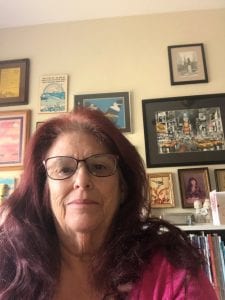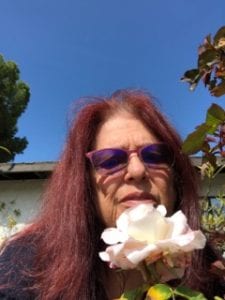In Which I Realize The Pandemic Experience Has Helped Me Finally Figure Out What It Means to “Stop and Smell the Roses”
By Trina O’Quinn for the NABBW

Trina O’Quinn
I have heard the expression, “stop and smell the roses” since I was 19 years old. This has been 56 years of my life. That is the entire length of my marriage.
Until I was 19, my parents believed that they needed to keep me busy so I wouldn’t get into trouble. (Translation: so that I wouldn’t get pregnant.) This was the 50s and early 60s, so that was their greatest fear — to have a daughter get pregnant before she was married.
The message I understood from their attitude was that ‘if you do not stay busy all your life, you will get into trouble.’ So being busy was my way of life. That was the inner voice I heard inside my head.
The pandemic caused me to suddenly stop being a “human doing” and forced me to learn to be a “human being.” My anxiety began to grow after a month at home with nowhere to go. As a way to cope with my rising anxiety I began to reflect, remember, rest, recharge, refocus, resolve and have curiosity.
As I began writing this month’s blog, I decided to use the phrase “stop and smell the roses” as a prompt, and let my curiosity about the phrase form the blog. This is what my curiosity discovered.

Trina actually stops to smell a rose
- When I stopped, I discovered that in order to really smell the roses in my front yard, I have to get close to them.
- As I get closer, I begin to see the entire living plant– more than just a bud on a stem to be put in a vase or a flower arrangement. I see the other parts of this Rose.
- It has deep roots; it is hardy and cannot be dug up easily.
- Most of the time, I had only looked at what is above ground.
In the past I would look and not see. Today, as I look at the parts of the rose bush that can be seen above ground, I see that it has branches with leaves and stems.
- The branches and stems have thorns.
- The thorns help to protect the beautiful bud.
- As the bud begins to open it has a fragrant odor.
- The odor attracts the butterflies and bees to the center of the flower.
- That is where all the richness and nourishment can be found.
- As the bees and butterflies nourish themselves on the flower, some of the pollen sticks to their legs, so, when they fly to other plants, they can pollinate more roses so they can grow.
Until I slowed down and really looked, I did not understand how much more there was to this plant besides a beautiful flower.
There was so much more. The next time I stopped to smell the roses, my experience was so different and meaningful. I began to reflect on how it was a metaphor for my life.
It reminds me of a two-week vacation to a new place. Did I really experience the visit or did I run through it and only get a small essence of what it was? As an example, let me compare and contrast two European trips I’ve taken:
In 2000, my husband and I took a three-week tour of Germany. The tour included all the major cities and sites of Germany.
- We stayed in each hotel a minimum of two nights before we traveled by coach to the next city and hotel.
- By the end of the trip I was very tired of packing, unpacking and wearing the same clothes without the opportunity to launder them.
- The tours and trips that we took began to blend together. We saw so much every day.
In contrast, in 2017 I went to Ireland for two weeks, I stayed in Dublin for the entire trip.
- I took tours and excursions every other day from my home base in Dublin.
- On the days that I didn’t tour I took adventures by foot in the city.
- I returned home content that I had taken in the Irish Culture.
I did not experience that same contentment after my Germany tour, even though I had been there an extra week. On the Germany trip I ran through the experiences, whereas on the Ireland trip, I stopped to smell the Irish Roses.
For me now, “stop and smell the roses“ has become a metaphor for how I participate in my life.
Until the pandemic, I was doing things without being present. I was doing, not being or experiencing.
Another way of looking at it is that I was always thinking of where I was going next or where I had been. I was not thinking of or experiencing where I was at the time.
Sometime in those early years when I absorbed the concept of “keep busy to stay out of trouble,” I began to believe that I was like a shark that has to keep moving to stay alive. Not only would I get into trouble if I stopped, I would most likely die.
What this pandemic has given me is the time to look at this belief and let it go. I have learned that letting go of these old beliefs have given me space for new beliefs. I’ve learned that I will not die or get into trouble if I stop.
- I have begun to notice what is in my immediate environment and I see and experience things that used to be just outside my awareness. I have a more complete experience in all that I do.
- I am learning that being and doing are not independent of each other. They can be done simultaneously. I can do and be at the same time.
- It makes for a much richer life. Stopping and smelling the roses has become an exciting experience and a creative adventure.
Trina O’Quinn is an actively licensed (California License # LMFT27407) Marriage and Family Therapist. Entering the profession as an older adult, Trina was in private practice for 30 years. During her career she was a lecturer at California University Dominguez Hills in the Marital and Family Therapy Program, where she supervised many students and mentored many associates.
Now retired, Trina keeps busy enjoying needle arts, reading, journaling and writing, as well as singing with a women’s chorus, peer networking, volunteering at a senior living center and reconnecting with old friends.



Leave a Reply
You must be logged in to post a comment.